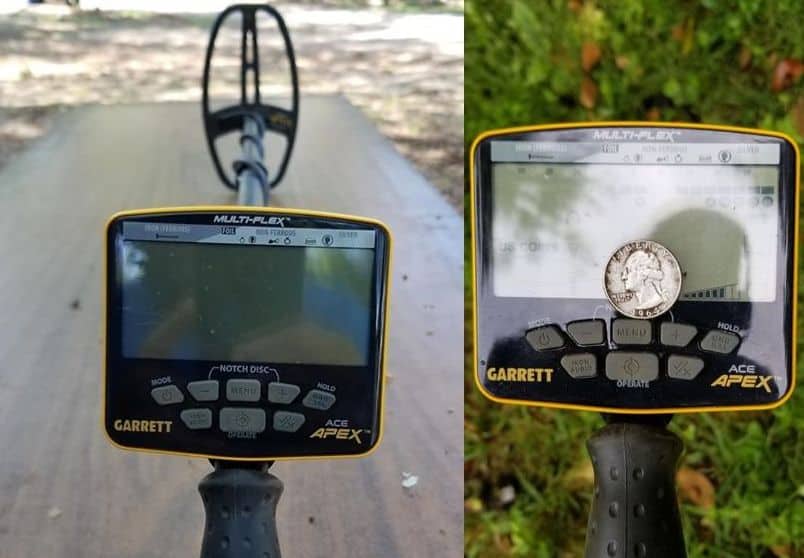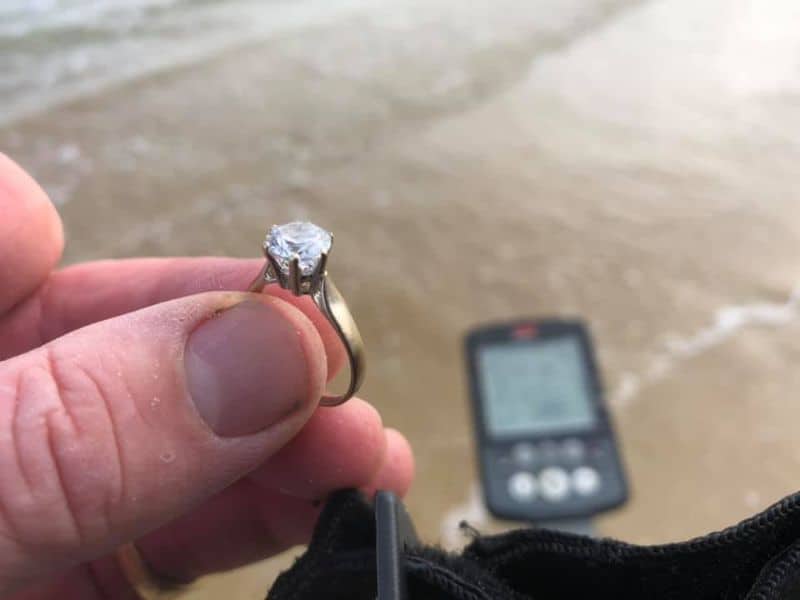
White gold is one the most searched precious metals out there. And for many detectorists, it remains quite mysterious whether they can easily find it or not …
In this article, I address this topic and I share how you can adjust your machine to yield more white gold targets!
Let’s dive in …
Key Takeaways
- White gold’s detectability depends on its alloy composition and their conductivity.
- High-traffic areas and historic sites are places with the highest probability of finding white gold jewelry.
- Proper care for white gold is extremely important because this type of metal could easily be damaged if not taken care of.
Why metal detectors are capable to find white gold?
Despite white gold’s silvery appearance, it contains gold, which is a conductive metal … White gold is an alloy made by combining gold with white metals like palladium, nickel and even silver in many cases.
White gold could be even more detectible especially when combined with other conductive metals.
Keep in mind that the varying proportions of these metals can dramatically affect detection depth and signal strength.
Metal Detectors operate by transmitting an electromagnetic field into the ground and metal targets provide a response by generating their own electromagnetic field that detectors can pick up.
Nonetheless, the exact response is not the same and can vary too much based on the specific composition of the white gold jewelry you are about to find … Frequency and technology of the machine is also an important factor you need to consider.
Metal detector recommendation for white gold …

The Garrett ACE Apex (Check Right it Here at Amazon) has solid versatility and frequency optimization capabilities, making it one of the best choices for finding white gold …
the Apex provides multiple frequency options … This includes simultaneous multi-frequency patterns that can allow you to find several elements all at the same time.
Indeed, it can detect the high conductivity of gold as well as varied conductive properties of the metals alloyed with it.
The machine also comes with high-resolution ground balance to operate very well in different terrains.
Best places to find white gold jewelry …

There are several places where you can find white gold jewelry, below are my favorite ones:
Beaches and Swimming Areas: White gold jewelry is easily lost during swimming or sunbathing. Indeed, cold water shrinks finger sizes which leads to rings slipping off. Bear in mind that these areas are not targeted by professional prospectors … This leaves the chance for people like us (hobbyists) to easily find them.
Old Battlefields and Campsites: Historical sites where soldiers or even campers were stationed can yield white gold targets. It was quite common before that soldiers receive white gold jewelry as gifts or tokens from their loved ones.
Hiking Trails Near Tourist Spots: Tourist-heavy trails could be a gold mind for this specific metal. Tourists are more likely to lose these possessions when they’re out of their normal/regular environment.
Public Parks and Fairgrounds: These high-traffic areas usually hold picnics, outdoor games, and celebrations and can result in misplaced white gold items.
Around Old Homesteads and Settlements: Places with a history of habitation may contain many items that were lost over decades. They can actually be unearthed, especially in areas where the ground hasn’t been overly disturbed.
Main challenges for detecting white gold …
There are couple of challenges that come with detecting white gold. I share below 3 important ones:
- Low Electrical Conductivity: Sometimes white gold could be alloyed with elements with less conductive properties. This can produce significant weaker signals.
- Varied Alloys: When while gold is alloyed with many elements at the time like nickel or palladium. These elements can confuse detectors designed for more conductive metals.
- Small Jewelry Detection: There are many white gold jewelries that can be small in size. This kind of elements necessitates higher frequency detectors to be able to locate them accurately.
How to fine-tune sensitivity and discrimination settings for better results?
If you are not used to detect white gold or if you are struggling doing so, then you should try to find tune your machine’s sensitivity and discrimination to maximize your chances … Below, 5 steps you should follow:
- Start with a Lower Sensitivity: You should always do so when dealing with new target types and new ground conditions. Indeed, you should begin with your detector’s sensitivity set to a lower level. By doing so, you will prevent false signals from highly mineralized soil particles.
- Increase Sensitivity Gradually: Slowly increase the sensitivity until you start to receive consistent signals. Through this action, you will deal with cases where gold is alloyed with lower conductivity metals.
- Adjust Discrimination: It is usually a better option to set your discrimination down. In fact, white gold can register measures that are very close to foil or nickel …That’s why if you set your discrimination level higher, then this might make you lose finds that are just around the corner.
- Test with Samples: I highly recommend using a piece of white gold as it will help you to test and find the perfect setting where the detector responds most reliably. I strongly suggest you have a look at this blueprint to build a test garden for metal detecting!
- Constant Ground Balancing: Continuously ground balance your detector each 1 or 2 hours while detecting to adapt to changing soil conditions. This will ensure a better detection and depth!
Tips to enhance chances of detecting white gold!
I would love to share with you 2 tips to maximize your success detecting white gold:
- Leverage Pulse Induction Technology: In case you are sure that an area has good amount of gold in it, then you may want to invest in a pulse induction (PI) metal detector. These sorts of machines can penetrate deeper even if you are dealing with high conductive soils.
- Utilize Sound Recognition Skills: This would take some time, yet, I would definitely advice you to develop an ear for the distinct audio tones of your beloved machine that signify white gold. Try to practice with known samples of white gold to familiarize yourself with its audio response.
What are the differences between detecting white and yellow gold?
The general approach for searching for white gold is pretty close to regular yellow gold. Yet, there are some differences you need to be aware of:
- Conductivity Variance: Yellow gold is typically more conductive since it is purer, while white gold is often alloyed with metals (nickel and palladium for example) … This just lowers its conductivity.
- Tone Response: Yellow gold usually produces a strong and clear signal, while gold doesn’t … This is because of its mixed composition that may result in a more nuanced tone that requires careful listening to distinguish.
- Corrosion Resistance: In today’s standard, white gold is often plated with rhodium; this makes it more resistant to corrosion and tarnishing. Indeed, white gold items might retain their metallic luster underground longer, which represent an advantage when visually scanning excavated soil or sand.
Care and handling recommendations for your white gold finds.
After finding a white gold element you’ll need to properly handle and take care for it. Below some helpful recommendations:
- Gentle Cleaning: By using a soft-bristled brush and a mixture of mild soap with warm water you need to start gently cleaning your white gold jewelry. Using harsh chemicals or abrasive materials is 100% forbidden, otherwise this can cause the object to be scratched at a deep level or just at the rhodium plating level.
- Rhodium Plating Maintenance: The rhodium plating tends to wear off on white gold as time goes on … This could expose the yellowish color of the gold alloy. It would be a great idea to consider having your jewelry find re-plated by a professional jeweler to restore their white finish. This will also provide additional protection against wear.
- Proper Storage: Many detectorists sleep on this detail … They take storing white gold items for granted … While they actually should store them separately in a fabric-lined jewelry box or at least wrap them in a soft cloth to prevent scratches. Never leave them exposed to direct sunlight, instead keep them in a cool, dry place away from chemicals that could harm your item.
Does fake gold set off metal detectors?
Yes, fake gold can set off metal detectors … Indeed, fake gold is usually made from metal alloys such as copper, nickel or zinc, and these metals can all be detected.
Nonetheless, you should bear in mind that the produced signal strength and characteristics will differ from those of real gold … The latter has a distinctive conductivity and density.
Over time, as you will gain more skills as a detectorist, you will easily discern these differences, especially if you use advanced detectors that allow for nuanced discrimination settings and analysis of the conductivity of detected metals.
Final Thoughts …
I honestly believe you are quite lucky to have all these info in one short article. Most people (even the most experienced detectorists) have little knowledge when it comes to white gold … Some of them don’t even recognize the difference with regular yellow gold …
If you implement half of what you’ve learnt here, you will do just Fine!
If you learnt something new from this article, please consider sharing it with your friends and social media … Thanks a lot for considering that!
If you don’t like the white color and you rather prefer the yellow one, then you probably should have a look at this helpful guide to detect regular gold with your beloved metal detector!
